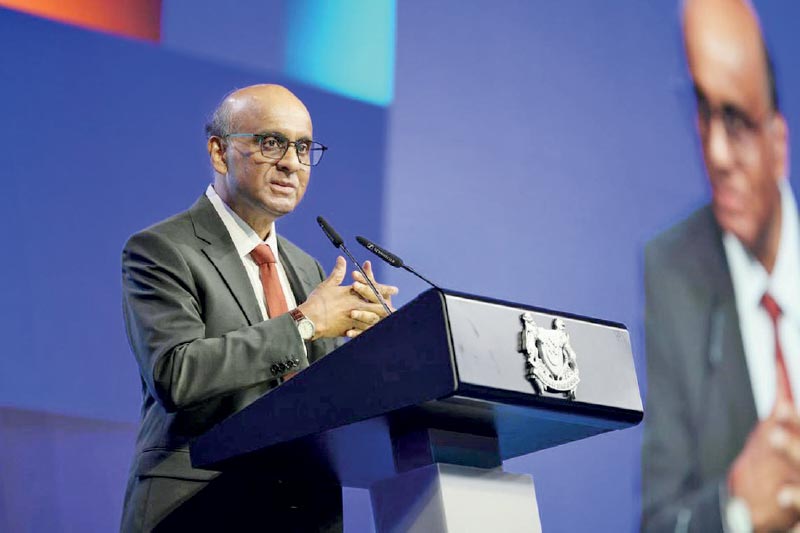Monday Feb 16, 2026
Monday Feb 16, 2026
Monday, 30 June 2025 02:02 - - {{hitsCtrl.values.hits}}

Singapore President Tharman Shanmugaratnam giving his opening address at the International Conference on Cohesive Societies on 24 June
 An important solution lies in urban design aimed at avoiding ethnic or social enclaves. Singapore’s integrated public housing estates are well-known, and unique in their scale. But it’s not just about housing. It is about having shared spaces for recreation, for learning, for interacting over morning qigong or on the futsal court – a whole estate built for social life and interaction
An important solution lies in urban design aimed at avoiding ethnic or social enclaves. Singapore’s integrated public housing estates are well-known, and unique in their scale. But it’s not just about housing. It is about having shared spaces for recreation, for learning, for interacting over morning qigong or on the futsal court – a whole estate built for social life and interaction
 The International Conference on Cohesive Societies (ICCS) held its third edition from 24 to 26 June 2025 in Singapore. This event gathered over 1,000 global thought leaders, policymakers, community practitioners and young leaders from more than 50 countries to exchange ideas and develop solutions for fostering cohesive and resilient multicultural societies.
The International Conference on Cohesive Societies (ICCS) held its third edition from 24 to 26 June 2025 in Singapore. This event gathered over 1,000 global thought leaders, policymakers, community practitioners and young leaders from more than 50 countries to exchange ideas and develop solutions for fostering cohesive and resilient multicultural societies.
The ICCS, themed “Cohesive Societies, Resilient Futures”, is organised by the S. Rajaratnam School of International Studies (RSIS) and supported by the Ministry of Culture, Community and Youth (MCCY). The three-day conference aimed to promote discussions on multiculturalism and what it takes to achieve harmony in diversity in an increasingly divided world.
President Tharman Shanmugaratnam gave the opening address at the International Conference on Cohesive Societies on 24 June (This is an abbreviated and edited extract from the transcript of the speech by President Tharman Shanmugaratnam on 24 June at the International Conference on Cohesive Societies).
What went wrong?
From extreme to mainstream. What is most worrying is how culture and identity have been injected into economic grievances, adding emotional virulence to the political debate.
A survey of eight countries across the Atlantic found that the single best way to know if people were likely to vote for a right-wing nationalist party was if they believed that minorities had better access to jobs than white people.
Radical right, exclusionary agendas are entering the mainstream. In many developing countries too, culture and religion have become a more prevalent feature of politics, along with a rise in anti-minority speech.
A visible shift lies in the more isolated way in which people are carrying out life, especially in some of the most digitally advanced countries. Studies show that they have become more likely to work, shop, eat takeaways, be entertained, and even worship at home. Young people are not hanging out as much with their friends, let alone going on dates.
We have to retain the democratising effect of the social media, but curtail how the tech companies’ algorithms take people too different and often opposing public squares, which entrenches divisions. The companies’ aim is to hook people onto their platforms rather than to divide society.
But as experts find, their algorithms tend to exacerbate polarisation over time, by funnelling people into echo chambers of similar views or partisan ideologies, and amplifying sensational content and disinformation.
More than a quilt
How do we ensure that as societies advance economically, they do not regress socially? How do we restore trust in one another, and build that sense of shared purpose in multicultural societies?
No political system, democracies included, can assure that moderation and inclusiveness will prevail. And identity-based, exclusionary views are never far below the surface.
We have to weave a different fabric of society to sustain multiculturalism. We must weave threads of different colours and textures into a single tapestry – or as they do for batik, involve different artisans in crafting a single fabric. So that we create the larger motif of a nation, with many strands and many histories, but at one with itself.
A community of respect
An important solution lies in urban design aimed at avoiding ethnic or social enclaves. Singapore’s integrated public housing estates are well-known, and unique in their scale. But it’s not just about housing. It is about having shared spaces for recreation, for learning, for interacting over morning qigong or on the futsal court – a whole estate built for social life and interaction.
Education is where it always starts. It is the most powerful tool a society has for integrating people. Bring children of all backgrounds together, particularly in public school systems, across ethnicities and social backgrounds. And keep them engaged together beyond classroom hours – sports, dance, and music, creating their own hip hop moves.
Equally important is whether education is effective in uplifting people of all backgrounds. People must see that everyone is able to develop their strengths and can get ahead on their merit, with support from government and community schemes for those starting from behind. Without that assurance, it will be difficult to sustain a sense of togetherness. There’s good reason why we have put great effort into this in Singapore.
Finally, we have to build a community of respect in each of our societies, from the ground up. Eating together, regardless of backgrounds. Providing a friendly ear. Delving into each other’s interests. Helping a neighbour’s child. These everyday deeds and actions matter. When others observe them happening often enough, the habits cascade. When they cascade, they create a culture.
Businesses have a role to promote multiculturalism and cohesion
Ho Kwon Ping, founder and executive chairman of hospitality company Banyan Group, questioned how many businesses in Singapore would still promote multiculturalism if the government of the day does not take the lead on it. Ho said Banyan Group employs 15,000 associates of 96 nationalities across 25 countries. He said the company sends diverse groups of people, or “task forces”, to the opening of a new hotel. “We go out of our way to put task forces that are there not just because of their different skills, but because of their different cultural, ethnic and religious backgrounds.” He said consumers should keep companies accountable to their DEI policies, which should be taught in business schools.
Fellow speaker Dinesh Vasu Dash, Minister of State for Culture, Community and Youth and Manpower, cited the Singapore Government’s three main pillars to ensure a multicultural society: the Ethnic Integration Policy in public housing, the use of the English language as a lingua franca alongside mother tongue languages, as well as national service. Agreeing with Ho, he said multiculturalism should be a goal that businesses and civil society, including religious organisations, take on.
Findings from Southeast Asian Social Cohesion Radar 2025
Against the backdrop of rising sectarian nationalist interests, the Southeast Asian Social Cohesion Radar was launched in 2022 to help track and analyse the state of social cohesiveness across the 10 ASEAN countries: Brunei Darussalam, Cambodia, Indonesia, Lao People’s Democratic Republic, Malaysia, Myanmar, Philippines, Singapore, Thailand, and Vietnam.
Key findings from the 2025 Southeast Asian Social Cohesion Radar
Foster proactive engagement between sectarian communities and policymakers across various domains of everyday life (e.g., workplaces, residential areas, public spaces) and across geographic divides (e.g., urban-rural). Regional initiatives including the International Conference on Cohesive Societies (ICCS) can serve as valuable platforms for dialogue. ICCS can act as a conduit for deeper exchange, helping to build empathy and mutual understanding across diverse groups.
Harness horizontal ties among ethnic groups, religious leaders, and non-government organisations to strengthen vertical ties between communities and their leaders. Policymakers could partner with civic actors and tap their deep understanding of local challenges. Such partnerships can enhance perceived representation and institutional fairness, ultimately nurturing greater trust in governance structures.
Develop strategic policies that prioritise the common good and address contemporary societal challenges. Specifically, policies that promote income equality, rural development, societal resilience, heritage preservation and shared experiences are most imperative.
Social cohesion in Sri Lanka
The stints at the Election Commission and the Office of a Governor, albeit in the Northern Province gave insights to the workings of Government and the realm of the possible from within.
We have an accentuated rural and urban divide. Whilst citizens are literate proficiency of the language of the other is not widespread. Where wealth distribution is a factor there are undeniable cleavages. We have played politics with community identities. At times we have targeted some. The years leading to the riots of 1983 saw an unmistakable trend. Repeated post Easter incident. Bots have been used to sway opinion seen at some elections. The struggle for jobs is acute. Scores come from rural areas to urban setting in search. Our last economic meltdown on the back of COVID impacted all heavily.
The country does have a strategy document. It draws on the National Policy on Reconciliation and Coexistence, Sri Lanka (2017); Office of National Unity and Reconciliation’s (ONUR) Reconciliation Strategic Plan - 2022 – 2026; the National Policy Framework for Social Integration; the National Action Plan for Social Integration; the White Paper “Towards a policy for Coexistence, Social Cohesion, Reconciliation and National Unity: A Synthesis of the Social Integration and Reconciliation” policy documents (2021). The strategy is heavy on reconciliation and sparse on the angles necessary for cohesion referred by the eminent voices heard in Singapore last week.
I argue we need to do more. AI is a critical influencer. The damage it can cause is far greater than all of social media known to us to date. In a setting where we already have man-made differences, it is easy to feed into algorithms our divisions. Rest AI will generate. AI driven BOTS can cause immense damage. We are nowhere near either regulating, policing effectively social media. AI led divisive strands can destroy us.
All our policies must have a central and inclusive focus on social cohesion. i.e. promote income equality, rural development, societal resilience, heritage preservation and shared experiences . If we do not it will give rise to several ‘aragalayas’.
Urban and town planning likewise must be equally sensitive to bring people and communities together. Economic policies likewise. Extremely important is education. We really must fast track the roll out of initiatives in our education system which promotes social cohesion. Lastly commerce must be mindful and be partner in the words of the President of Singapore to create a piece of batik – a single fabric crafted by different hands to create a larger motif of many colours.
(The writer is former Member Commissioner, Election Commission and former Governor, Northern Province.)